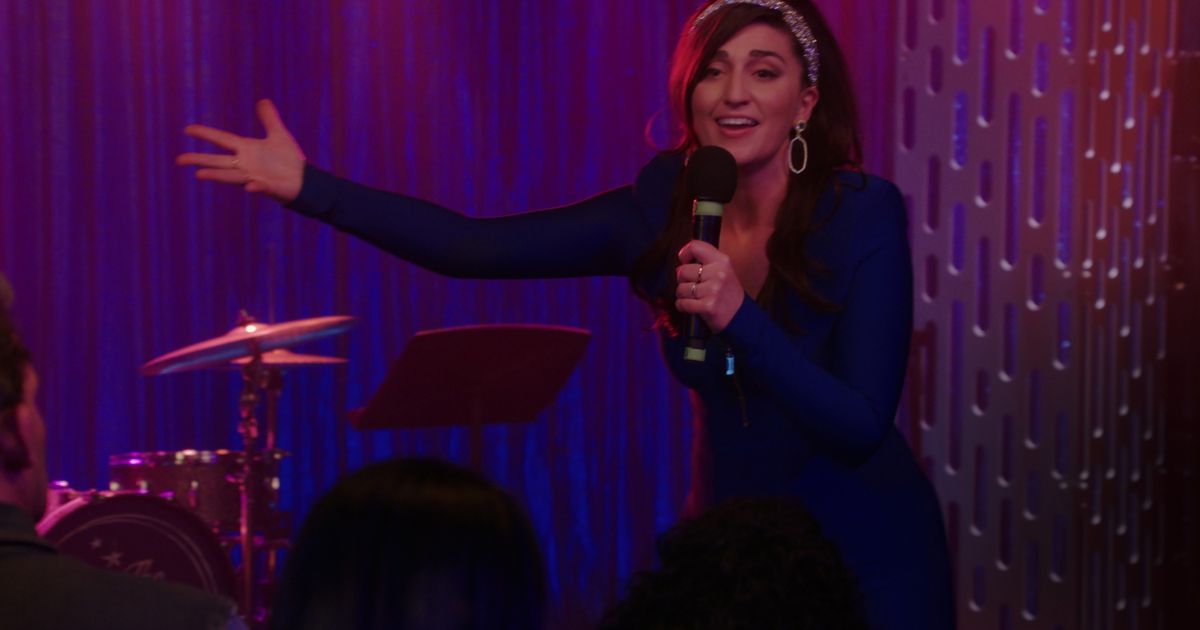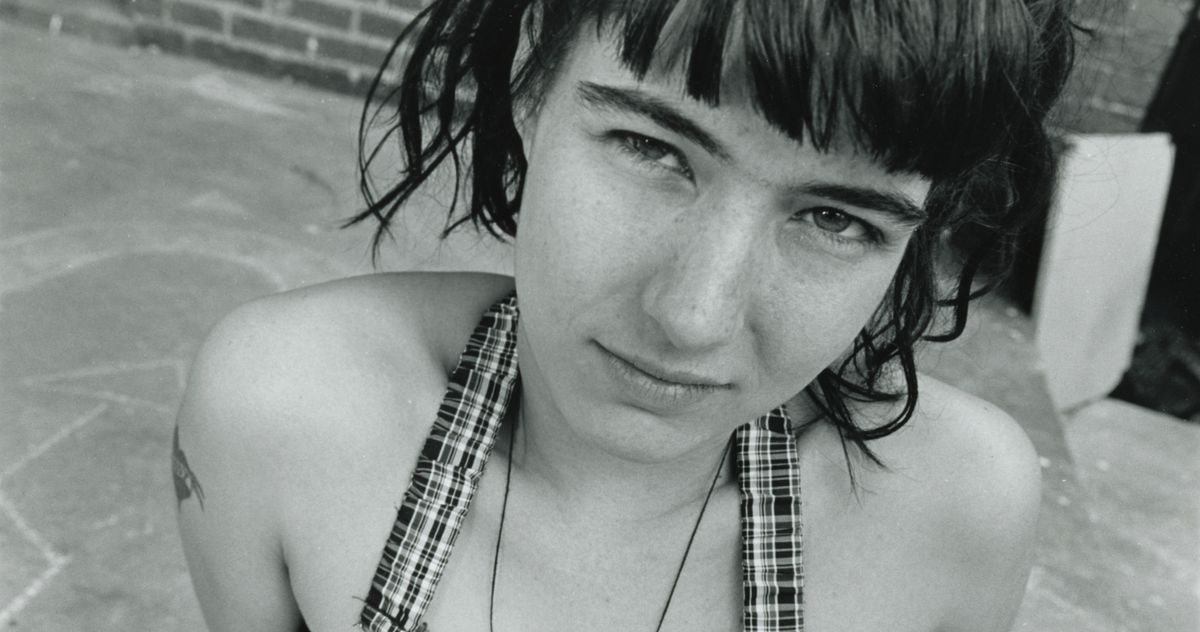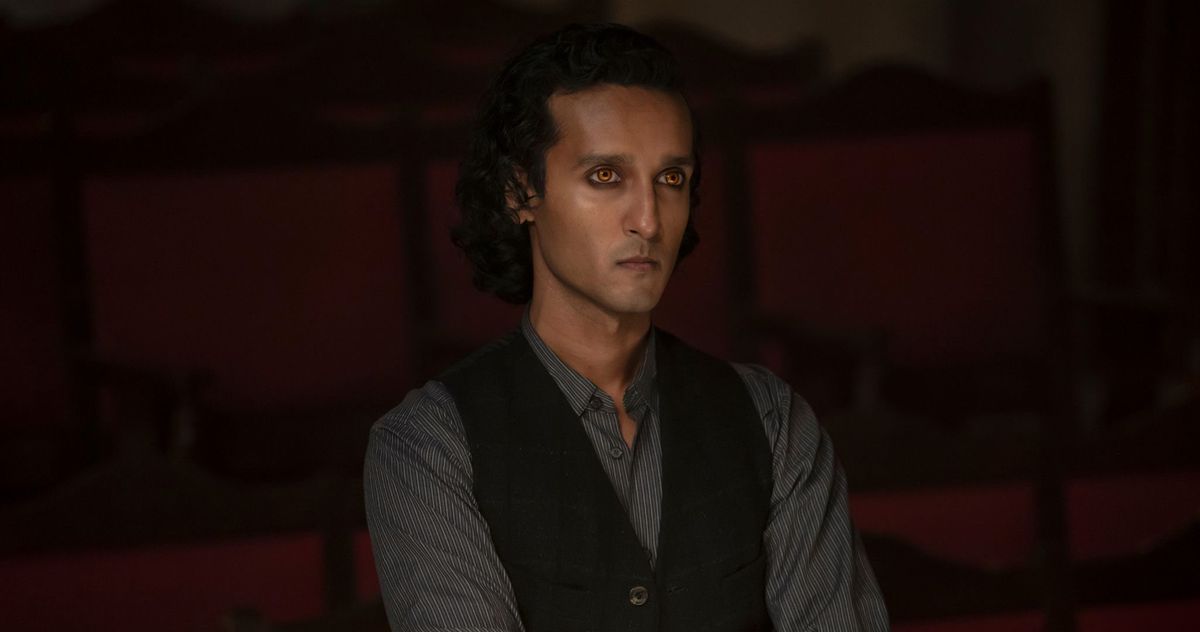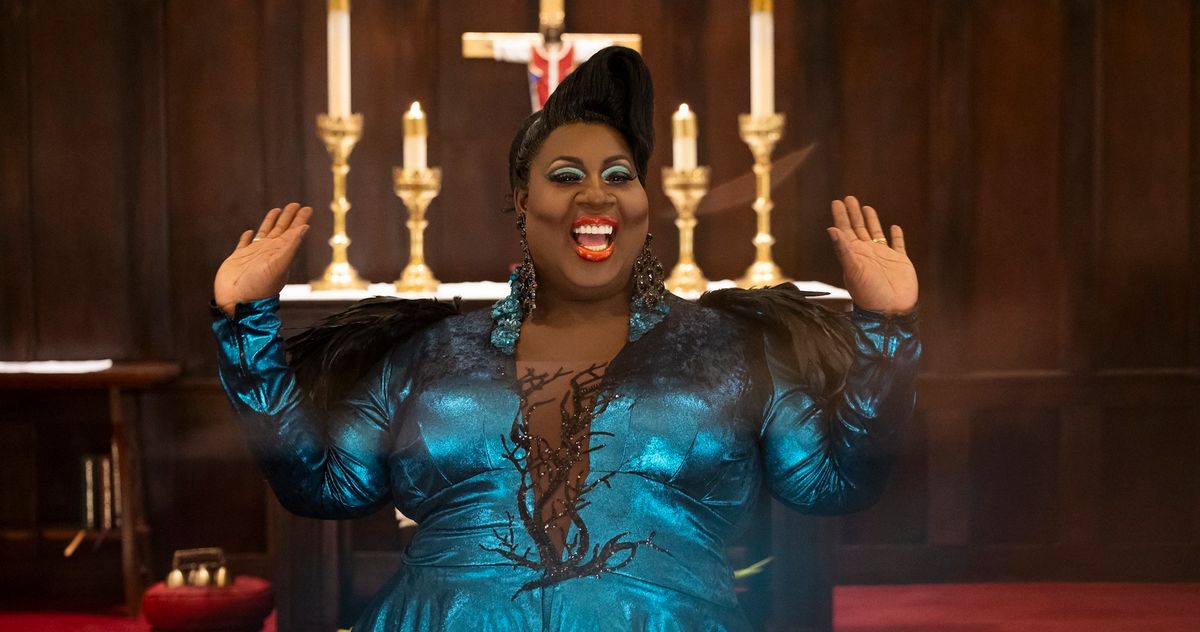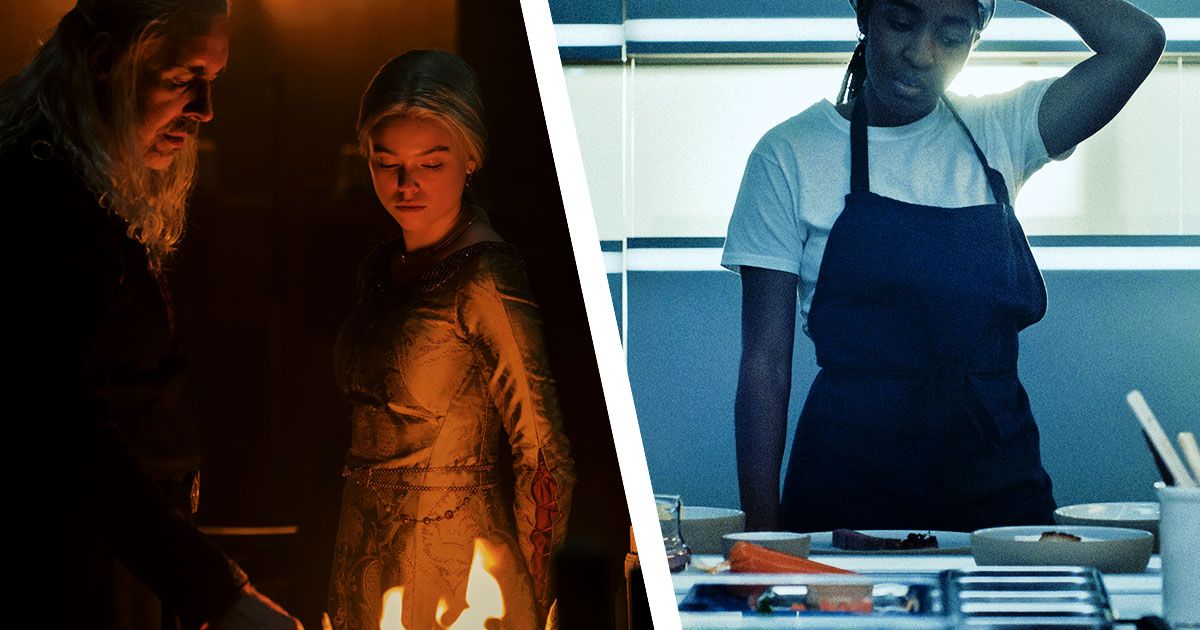“But do I want to do more? Absolutely. That part is truly out of my hands.”
Photo: Netflix/Courtesy Everett Collection
It has been over two months since Girls5eva wrapped up its third season, which followed the girl group as it zigzagged across the country on tour in hopes of reclaiming another chance at fame. While the former pop stars don’t exactly meet that goal — they only sell out Radio City Music Hall by triggering a ticket-resale bot army — the experience bonds the quartet even closer together. It all crescendos with Dawn (Sara Bareilles) triumphantly crooning about how “staying in the middle is the only way to go” for the group’s post-Y2K career aspirations. They don’t need to be needle-movers, but if they trust time, good things can come slow — or as Dawn puts it in the finale, “I want to do what I love for a very long time.”
The same can be said about how Bareilles looks at the future of the show itself. After Girls5eva moved from Peacock to Netflix for its third season, its stars and creative team were optimistic that its small but devoted viewership would explode on the larger platform — even if it meant accepting a shorter episode count and tighter filming schedule. But that didn’t happen. The season never made Netflix’s carousel of top-ten television shows the week it debuted, and subsequent buzz flew away like a pack of butterfly hair clips. Despite this disappointment, Bareilles remains hopeful that we’ll soon get more big pussy energy. She’s still waiting on news of a fourth season like the rest of us, but she would happily take any medium that allows her to portray Dawn again. “I’ve been pushing for the movie. I’m like, ‘Let’s Sex and the City this thing,’” she says. Until Netflix makes a final verdict, Bareilles encourages everyone to do their community service of recommending Girls5eva to as many people as possible. “And if you have any ideas for campaigns,” she adds, “I will show up.”
One of the most compelling ideas to emerge from this season is the desired level of fame a person should strive for. In her finale showstopper, Dawn sings that “the middle is the riddle of it all, and the medium time is just fine for now.” Has this “medium time” reflected what you strived for with your own career?
Oh my God, yes. I’ve been so delighted by the fact that I’m able to stretch artistically. I don’t feel like there are spaces I’m not able to explore or look into in my career. One of the things I was always very afraid of, if I’m being honest, is an extreme amount of fame. Not that it was right on my doorstep, but I’m not sure I have the constitution for dealing with that. I really love this ability to lead a “normal” life and still get to work in an industry that’s public-facing and has a large platform. That’s one of the things in culture, and in society, that we struggle with: There’s always this underpinning of ambition. It’s so quintessentially American to want to grow the brand, often to a fault.
There’s something really beautiful about resting in the place you are. That’s the wisdom of Richard Kind, who’s the perfect vessel for that message this season. He’s so funny and he’s had such an illustrious career, but he’s also a guy who can walk down the street and go into the deli and be left alone. I find it interesting to watch these middle-aged women in the show who have a really strong ambition. They’re dealing with juggling homelife and personal issues, having this career-focused ambition, and getting a second chance to appreciate what they have achieved. That’s something undervalued: looking at where you are and the gratitude that comes along with it. It sounds so cliché, but not everyone has gratitude for what they’ve achieved.
Another compromise Dawn accepts is if morally questionable money supports her real art, such as performing at a birthday party for repugnant billionaires. Is this a type of reckoning you’ve also had to deal with over the years?
It’s definitely something I had to deal with. Everyone makes that very personal decision about where you draw the line for yourself. Sometimes it’s informed by experience and stature. A lot of young artists feel they can’t say “no” yet — admittedly, I challenge that idea. But I also can relate to when you’re hungry, trying to just get your foot in the door, and maybe not financially secure. I understand why those opportunities are so titillating. I’ve certainly said “no” to things because I’m like, Well, I’m not going to take money from these people, but everyone has to make those decisions for themselves.
The thing I’ve learned in my career more than anything else is every time I sit on some high horse about something, I’m usually proven wrong. You just don’t fucking know what people are making their decisions for. Someone might take a big-money job and then donate 100 percent of it to some nonprofit charity they work for. You have no idea why people make the decisions they make, so I try not to judge them. But for me, I try to stay pretty aligned with my moral values around money and moneymaking because it’s tricky and can be complicated.
Knowing the “Love Song” origin story, I loved the brief line where your character jokes that “Maybe I could write something commercial” as a cash grab. Did your personal experiences in the industry inform the scripts at all?
They did, in a sense. Meredith Scardino and I, and all of the cast, had lots of conversations around our real lives and what was going on within them. There’s that great line from season two where my character literally says, “Well, I’m not going to write them a love song, because they asked for it.” I’m quoting “Love Song.” One of Meredith’s genius brushstrokes was to integrate those real stories in some way. For instance, in my own personal life I’ve had less success with trying to do stuff that’s purely commercially driven. It’s not even because I didn’t try, but it doesn’t flow for me. It just doesn’t work.
I remember a few years ago I was given a big advertisement campaign. A company came to me and asked me to write a song. It was a lot of money. I kind of tried for a while and finally was like, This is bad. Nothing’s happening here. I can’t do it. I don’t know how to force the fit here. I tend to listen to the music itself and where it wants to go. This is my way of saying I think it’s understandable for these women, as a Girls5eva unit, to want to up their game and figure out how to get back in touch with this industry.
Do you feel nostalgic about the 2000s? Unlike Dawn, you don’t strike me as a person who is embarrassed by or has regretted their early work.
I was so deeply insecure during that time. I hesitate to say unhappy. It was a very challenging time for me, from a mental-health perspective. I didn’t have the right resources in place — meaning the right therapist, the right medication, and the right kind of tools to manage my own predisposition toward melancholy, stress, anxiety, and depression. So, no, I’m not at all nostalgic for that time. I’ll say the piece I’m nostalgic for is what I found with working in new mediums and how they unlock things for me. You know, that beginner’s mind — the part of you that doesn’t know what you’re doing and the part of you that’s really drawn to whatever the project is in front of you, whether you’re making a new song, an album, a book, or a musical.
I really miss the way I felt about making my first record. It was my entire world. I could think about nothing else, and I don’t have that same kind of relationship to that fixation, which is probably healthy. But I do remember how fulfilling and intoxicating it was to feel enraptured by art in that way. It was so special. I found it a little bit with trying new things as an adult, but I do miss the way my mind used to work when I was younger.
How did you handle the show’s initial cancellation on Peacock?
This baby girl had no idea. I’m very naïve to the inner workings of the television industry. We didn’t get a phone call that we were canceled. We just didn’t hear anything for a while, and I didn’t know what to make of that, because I didn’t have any context for how long it takes to hear about these types of developments. So I was kind of, I don’t know, optimistic. I was waiting to get our marching orders and then we all got the call that they were trying to make the move to Netflix. That was very exciting.
Listen, there was this sense when season two came out that we got a lot of critical love and acclaim, but it felt kind of quiet. There was a feeling that we weren’t finding our audience. I was definitely tuned in to that. So we got the news that we were trying to move, and it took a while for all of that to get sorted out. From what I’ve heard from our executives and creative team, it was a pretty substantial move to extricate the show and get this deal. It felt like a great vote of confidence: We were going to get another chance to be seen and on a platform that had a big built-in audience.
We were all so relieved to get to do it again because we’ve really bonded since we started making this show in the height of the pandemic. We were all at our own personal lows in our respective ways. This show became such a source of light, joy, and connection. These women have all become very close friends, so there would be such sadness if we weren’t able to continue this. We would still be friends, of course, but I really believe in the show so much. It’s so smart and so funny. I want more and more people to get to see it.
Generally speaking, did this third season feel different than making Girls5eva at Peacock? Were you given more creative freedom?
I didn’t feel any difference creatively. I think that’s a testament to the way Meredith runs the show. If there were major changes, we weren’t privy to those conversations. The thing that felt different is we were doing six episodes instead of eight episodes, so there was a little less time together. But other than that, no — I didn’t feel a looming presence. Netflix was super-supportive from the outset and excited to be onboard. There was a lot of encouragement, and it felt good.
Your budget and allotted filming time were slashed for the sake of creating this third season. I understand certain things were rushed for the sake of how much you all love the show. Do you think this is a sustainable process for the future?
If that’s what we have to do, we’ll do it. But my hope is that we get to stretch a little bit and, if nothing else, make a few more episodes — at least to get back to eight episodes.
We did such a great job compressing the season into six episodes. I feel like we still got a full meal this season. It helped that the group was doing this tour throughout the country, because they were out having this contained experience, and next we’ll see the repercussions of that. It’s almost okay that it was a little shorter. We’re an ambitious show. The sets remained the same; they really go to the ends of the earth to make even a two-second joke be filmed. It’s very 30 Rock in that way. So I didn’t feel like we were skimping, but I would want more episodes.
What do you know about the show’s metric of success at Netflix?
I don’t have any information about streaming numbers. From what I know, there’s just a hope that the audience will continue to build and more people will watch this show. I’ve gotten phone calls and text messages from people out of the blue. Jack Antonoff was like, “I can’t believe you. I’m in this fucking show and you didn’t tell me?” He loves it. St. Vincent loves it. Norah Jones loves it. Everybody I know in the music industry loves this show. So that makes me feel, as someone who looks around and loves their peers and wants them to love what I get to make, so cool and grateful. It’s just a matter of getting more eyeballs.
I have to say, as a massive Girls5eva fan, I feel like the season went by without much acknowledgment or sense of investment. We even wrote a piece last month titled “No One’s Watching the Best Comedy on Netflix.” Do you personally consider this third season a success?
I do. Look, I also work very closely in the theater industry, in which there are so many shows opening and closing every minute. My personal philosophy around defining success is it cannot be tied to a metric of whether or not it made a huge splash commercially. Look at Freaks and Geeks: It had one season, and yet it’s so many people’s favorite show.
You can’t look at the value or merit of the work you make based on what it does in the marketplace. I think that’s a recipe for disaster, because there’s so much that’s out of your control. When I look at the show, I’m like, We’re so fucking funny and smart. The writing is amazing and full of joy. It’s a hard comedy, which there aren’t many of these days. There are so many wonderful scripted shows that are doing this in-between dramedy thing, but this is a real-deal comedy show. I got to work with my fucking heroes. I made some of my dearest, closest, and best friends by working on the show. Yes, I’m already popping the Champagne of the show and the season because I’m thrilled by everything about this.
But do I want to do more? Absolutely. That part is truly out of my hands, so I’ve got to make peace with that.
Regardless of what the future holds, how has your perception of yourself as an actor changed over these three seasons? Is it on equal footing as a singer and songwriter?
Not right now. I have so much to learn as an actor. That’s part of the beginner’s mind-set I was talking about. What I love about this show is how I’ve felt and seen myself grow over these three seasons. I’m learning from incredible teachers on set and off — not only Tina Fey and Meredith but my co-stars and guest stars. There’s so much to absorb and take in around this craft. I love that I get to play in the comedy space because it’s a lot of what I consume and what I’ve always consumed. My brand is sort of “earnest vulnerability.” So it was fun to work in something that was purely joyful and had heart but was leading with something else. It makes me excited to hopefully get to learn and do more.




